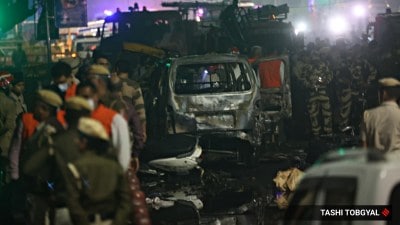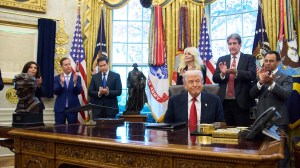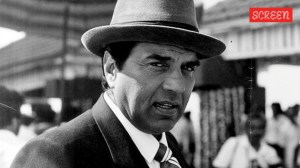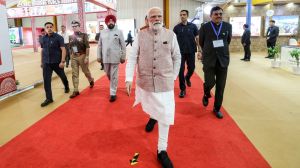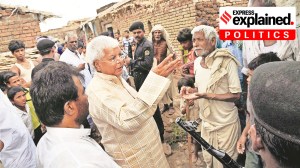Musharraf: From Gen to President
President Pervez Musharraf should be pleased as punch. In one month, he has had two brushes with death and lived to tell the tale. He has re...

President Pervez Musharraf should be pleased as punch. In one month, he has had two brushes with death and lived to tell the tale. He has resolved the year-long Legal Framework Order deadlock in the National Assembly by means of a consummate deal with the Muttahida Majlis-e-Amal. He has become a constitutional president of Pakistan by a novel but legitimate device.
And, despite the expected hiccups, he has helped open a new chapter in peaceful relations
with India.
To be sure, the President Musharraf that we saw in a dark suit happily fielding questions from the press at the conclusion of the SAARC summit last Tuesday was a very different man from the aggressive General Musharraf in camouflage green who had pooh-pooed the composite dialogue advocated at the Lahore summit in 1999, who had launched Kargil and who had once said he would never talk to India unless it was prepared to talk about the core issue of Kashmir and Kashmir alone.
It was also a different Musharraf from the one who went to Agra in 2001 but walked out in a huff when the Indians insisted on putting a clause on terrorism into the proposed joint statement. On Tuesday January 6, 2004, the joint statement stressed the need for a composite dialogue on all issues and was conspicuous by the insertion of President Musharraf’s personal reassurances in regard to stomping out terrorism from Pakistani soil.
Well, well, well. We are delighted at the outcome of the SAARC summit. It has taken Pakistan 15 years to realise that India cannot be bled to concede Kashmir. And it has taken India that long to realise that it cannot hold on to the status quo in Kashmir by force.
It has taken Pakistan’s hardliners a long time to realise that a buoyant economy and not war in Kashmir is the lifeline to building a modern nation-state just as it has taken the Indian hardliners a long time to realise that a state of unresolved war with a wronged neighbour is not good for the emerging market-big power status that India seeks for itself in the world.
The success of the latest initiative has depended on several factors. Flexibility on both sides was, of course, on top of the list. General Musharraf has rightly abandoned Pakistan’s maximalist position based on the UN resolutions while Prime Minister Atal Behari Vajpayee has correctly accepted that the issue of Jammu and Kashmir will have to be resolved to the satisfaction of both sides, implicitly admitting Pakistan’s right to be part of the equation of any solution.
Thankfully, too, hawkishness was not paraded as a sign of patriotism. Musharraf says this is a great victory for the moderates, suggesting that the tap of militant jihad in Kashmir will finally be turned off. Vajpayee has agreed to the peace dialogue with Pakistan beginning next month, only a couple of months ahead of India’s general elections, suggesting that Paki-bashing will not be exploited by the BJP to garner votes.
Secret diplomacy away from the prying eyes and hype of the media was the third factor in achieving this win-win result. Since last April, when Vajpayee offered a conditional hand of friendship to Pakistan, and in subsequent offers of confidence building by both sides, the footprints of the Indian prime minister’s national security advisor, Brajesh Mishra, and that of the secretary to the National Security Council of Pakistan, Tariq Aziz, have been all over the capitals of the world.
In recent times, the DG-ISI, General Ehsan ul Haq, has also quietly lent his shoulders to the task at hand. That is just as well. The ISI’s self-conferred epithet of Invisible Soldiers of Islam is definitely out of fashion in these times.
Finally, the role of the international community, especially the United States, in constantly nudging both sides, should not be underestimated. Strong denials from both countries are perfectly understandable. They are awash in anti-Americanism and it would have been unwise for the US to have been seen as a strong, upfront player.
The US has told New Delhi that if it wants a long term strategic partnership with Washington, it will have to get its act together in the region instead of constantly nuke rattling with Pakistan. And it has told Pakistan that if it doesn’t want to be hauled over the coals for proliferating nuclear knowhow, it must wind down the jihad business, turn back the tide of radical Islam and make up with India.
The dividends for India of heeding, and the costs for Pakistan of spurning, American advice cannot be ignored by either. Of course, strong vested interests on both sides will try and derail the proposed dialogue. Pride and prejudice, the weight of history, and stubborn point-scoring bureaucracies will thwart progress at every step.
But if both leaders and peoples persist in their quest, the blocks of peace will fall into place slowly but surely. The one positive factor in the peace process is the rational transformation of the institutional hardliners in both countries — the army in Pakistan and the BJP in India — into self-redeemed and even self-righteous moderates.
Friday Times





- 01
- 02
- 03
- 04
- 05


